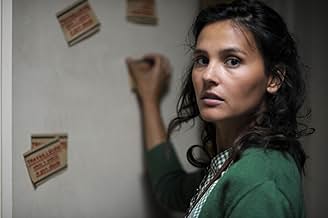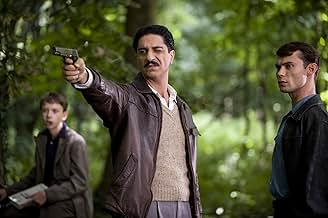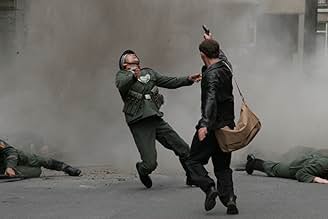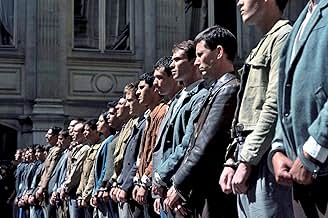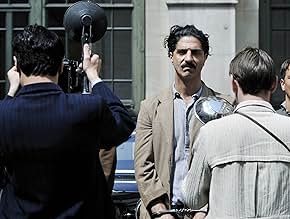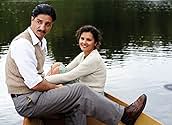L'armée du crime
- 2009
- Tous publics
- 2h 19min
Ajouter une intrigue dans votre langueThe poet Missak Manouchian leads a mixed bag of youngsters and immigrants in a clandestine battle against the Nazi occupation. Twenty-two men and one woman fighting for an ideal and for free... Tout lireThe poet Missak Manouchian leads a mixed bag of youngsters and immigrants in a clandestine battle against the Nazi occupation. Twenty-two men and one woman fighting for an ideal and for freedom. News of their daring attacks, including the assassination of an SS general, eventuall... Tout lireThe poet Missak Manouchian leads a mixed bag of youngsters and immigrants in a clandestine battle against the Nazi occupation. Twenty-two men and one woman fighting for an ideal and for freedom. News of their daring attacks, including the assassination of an SS general, eventually reaches Berlin.
- Réalisation
- Scénario
- Casting principal
- Récompenses
- 4 victoires et 1 nomination au total
Avis à la une
It gave pause to wonder whether these resistance fighters were actually achieving anything of significance or risking their lives to pop off a few Nazi soldiers for no great tactical advantage.
It offered the viewer titillating glimpses of two beautiful actresses, Virginie Ledoyen and Lola Naymark.
But on the whole, the movie was dull. The characters were flat. There was little development in the plot: rather, a series of adventures culminating in predictable misadventure. It dragged on from one scene to the next without engaging. Six out of ten.
This is a traditional movie about the French resistance. Virginie Ledoyen leads a big cast of characters. Fewer lead characters could have intensified each person's story. There are way too many side characters in the group. The movie needs to stay on the Manouchians and Marcel and only them. It's a little stop and go with the flow. It's well filmed but needs a bit more to differentiate from the standard retelling.
Guédiguian's film lacks the noirish flavor of Melville or the Butch Cassidy and Sundance panache of Madsen's film; but it starts well with Grégoire Leprince-Ringuet and Robinson Stévenin as two brave young men who begin acting on their own, and later are recruited to serve a more organized cause. There were always contrasts between young upstarts and disciplined old-timers. Resistance fighters worked outside the law and sub rosa; the "shadow" army was an army of "crime." Though the phrase "Army of Crime" is a Vichy smear issued after the principals of this story were rounded up and eliminated, the resistance life always attracted rebels and outliers.
The gentle Armenian poet Missak Manouchian (Simon Abkarian) is the leader. His ballsy girlfriend Mélinée (the lovely Virginie Ledoyen) marries him and becomes a passionate supporter after his release from internment gradually turns him from peaceful propagandist to one capable of throwing a grenade into a German marching squad and taking out a dozen German soldiers (an incident neatly filmed here). He gets to know fiery young Marxist bomb-rigger Thomas Elek (Leprince-Ringuet) and swim-champion-pistol killer Marcel Rayman (Stévenin). Marcel becomes infuriated when his parents are taken away and he learns that he won't ever see them again. He begins asking one German officer after another for a light and then pulling a pistol and killing them. He's good at less close range too and gives Missak a lesson in marksmanship. Thomas blows up a Nazi literary gathering by planting a big copy of Das Kapital with a time bomb inside.
Older group leaders periodically chide the younger ones for acting independently and not maintaining cover; but it is one of the older ones who eventually names many members of the group after capture. Various group scenes, including an Armenian musical celebration with Zorba-style performances visited by a group of French cops, show that the authorities are onto the foreign communists and the rashness of one can endanger many.
We get a look at French cops called upon by German occupiers to squash the resisters. They enlist a certain Inspector Pujol ( Jean-Pierre Darroussin), who plays a dubious Judas game of informing, rounding up Jews, and gaining rapid promotion by the French Gestapo while simultaneously sympathizing with the partisans, sleeping with a Jewish girl, and doling out favors to her, including gentler treatment for her interned family members. She wants to be a partisan too, but seems destined to go the way of the anonymous protagonist of Max Färberböck's A Woman in Berlin.
The FTP-MOI throws out flyers (from above, so they won't be seen) urging the French to sabotage Vichy-run industries. Their other mission is to strike visible blows at the Nazis, assassinating major figures of the Nazis in France like General Julius Ritter.
A theme of the film is the complex bonds forged among immigrants and the loyalties among resisters. Missak , whose parents were murdered by Turks, looks upon his Parisian communist friends as his new adopted family. Marcel knows what remains of his family is only his little brother Simon (Léopold Szabatura), and so takes him everywhere; unfortunately that meant that in a raid that targets Marcel, Simon is taken away. An original touch is a homage to the young militant, Henri Krasucki (Adrien Jolivet), who took it upon himself to bring Simon back alive from the concentration camp where they were sent.
In The Army of Crime, the mix of nationalities and motivations is continually interesting and harmonizes nicely with the picture of how quite disparate individuals came together Very important also is that toward the end, Guérdiguian films sequences of the mass corralling and deportation of Jewish people by the French out of a stadium, an infamous moment that deserves to be seen as well as read about. The film is less effective in evoking strong emotion, and despite its generally favorable reception in September in France (after a Cannes summer debut), it's been criticized for a lackluster mise-en-scene. Some communist historians in France have insisted that Marcel is over-mythologized; that there was more restraint and coordination and more direct Soviet supervision than is shown. However the film's strengths remain its focus on youth and its strong ethnic and cultural mix.
This is involving, fascinating stuff, and as good an evocation of that place and time as I can think of, but it doesn't seem as personal as the other films by Guédiguian that I've seen -- The Town Is Quiet (in US theaters) and Lady Jane (SFIFF). But since he is a communist of working-class origins with an Armenian father, it may be in another sense the most personal thing he has done. Another film of his, the 2006 Armenia/Le voyage en Arménie, is about rediscovering Armenian roots.
Shown as part of the Rendez-Vous with French Cinema at Lincoln Center, March 2010.
Marcel Ophüls' 1969 documentary The Sorrow and the Pity is all anyone needs to see to comprehend the loathsome extent to which the government in France (uniquely) collaborated with murderous fascists. However folks are no longer keen on seeing four hour long black and white documentaries what with their absence of music video effects and popular music and such. So Guédiguian has revived the history, and not just for revival's sake, also to counter contemporary anti-immigrant prejudice. Whilst the naturalised French, in large proportion failed to resist the Nazis, many French immigrants on the other hand laid down their lives in the Communist resistance. By contrast, the low point of the entire collaboration was when a twentieth century French police force decided to resurrect the Carthaginian traditions of mass child sacrifice, and chose as their Tophet, the Velodrome d'Hiver. Without the help of a single Wehrmacht soldier, SS soldier, or Gestapo thug, the French police rounded up 13,000 Jewish souls including 4,000 children, who were then shipped off to Auschwitz. Against these existential lepers of the Gendarmerie stood Missak Manouchian and his band of fighters (the FTP-MOI), many of whom had already fought the tide of fascism in Spain.
Manouchian is a very interesting character who perhaps received the most character development of all the fighters. He was an Armenian refugee, who survived the Armenian Genocide, which was perpetrated by the Ottoman Army. Out of the silence that followed his terrifying experiences grew his poetry, which was beautiful (based on the example we see in the film). He has to take two key compromises during the film. In order to escape from a camp of hostages, he has to sign a document declaring that he is not a communist. Initially he refuses to sign, but in order to live he eventually does. The second key compromise is when he agrees to kill even though he does not believe in killing, calling it "unethical". It is very difficult for the fighters, they are so full of life, they decide that they must be the enemies of the enemies of life.
Please note that there is a scene of gruelling torture in this film, committed of course by the French police.
It's one of those rare films that is actually edifying, where you come out with a will to live, a will to do right, and a will to speak out against racial intolerance. It is the polar opposite of the crass and odious Inlgorious Basterds, still playing at the cinema, and attracting over a hundred times more spectators.
Le saviez-vous
- AnecdotesCharacters Micha Aznavourian (Serge Avedikian) and Knar Aznavourian (Christina Galstian) were, in real life, the parents of singer and actor Charles Aznavour. Whilst Charles does not feature, as a character, in the film, he is briefly mentioned by his parents (as characters), around 42' 55" into the movie, as having early success as a child singer.
- GaffesWhen showed up to the press after being arrested in November 1943, a member of the group tells a policeman the FFI will avenge them when they come. The FFI (Forces Francaises de l'Interieur) was regrouping several resistance groups and was created in 1944.
- ConnexionsReferenced in The Tonight Show Starring Jimmy Fallon: Adam Sandler/Judd Apatow (2015)
- Bandes originalesString Quartet No.17 in B-flat major K. 458
Written by Wolfgang Amadeus Mozart (as Mozart)
Sung by Delphine Bardin, Laurent-Benoit Ostyn, Jean-Claude Tchevrekdjian (Claude Tcheurekdjian), Vincent Dormieu, Olivier Perrin
Enregistrés par Simon Derasse
Meilleurs choix
- How long is Army of Crime?Alimenté par Alexa
Détails
- Date de sortie
- Pays d’origine
- Site officiel
- Langues
- Aussi connu sous le nom de
- Army of Crime
- Lieux de tournage
- Sociétés de production
- Voir plus de crédits d'entreprise sur IMDbPro
Box-office
- Montant brut aux États-Unis et au Canada
- 37 031 $US
- Week-end de sortie aux États-Unis et au Canada
- 8 102 $US
- 22 août 2010
- Montant brut mondial
- 1 199 877 $US
- Durée
- 2h 19min(139 min)
- Couleur
- Mixage
- Rapport de forme
- 1.85 : 1


